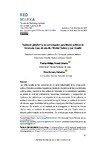Mostrar o rexistro simple do ítem
Facebook: plataforma de comunicación para líderes políticos de Venezuela. Caso de estudio: Nicolás Maduro y Juan Guaidó
| dc.contributor.author | Puertas Hidalgo, Rosario | |
| dc.contributor.author | Mora Romero, Katherine del Cisne | |
| dc.date.accessioned | 2020-01-15T10:19:04Z | |
| dc.date.available | 2020-01-15T10:19:04Z | |
| dc.date.issued | 2019 | |
| dc.identifier.citation | Puertas-Hidalgo, R., & Romero-Mora, K. (2019). Facebook: plataforma de comunicación para líderes políticos de Venezuela. Caso de estudio: Nicolás Maduro y Juan Guaidó. Redmarka. Revista De Marketing Aplicado, 23(3), 47-64. https://doi.org/10.17979/redma.2019.23.3.5884 | es_ES |
| dc.identifier.issn | 1852-2300 | |
| dc.identifier.uri | http://hdl.handle.net/2183/24650 | |
| dc.description.abstract | [Resumen] Las redes sociales se han convertido en un canal indispensable de la comunicación política. El objetivo es analizar la gestión en Facebook y la retórica del discurso de líderes políticos antes y durante la crisis política de Venezuela. En la metodología cuantitativa se analiza el total de publicaciones, reacciones, comentarios y compartidos. Se clasificaron las publicaciones con etiquetas de temas recurrentes. En la cualitativa, se analiza el contenido en base a la teoría del framing de Entman y el análisis de la retórica del discurso según Aristóteles (ethos, pathos y logos) para identificar la persuasión en el discurso. De acuerdo con el resultado de la investigación, el discurso de Nicolás Maduro tiene un trasfondo de manipulación, mientras que Juan Guaidó utiliza un discurso político basado en las emociones. Se concluye que existe diferencia en el manejo de Facebook de Nicolás Maduro y Juan Guaidó, tanto antes como después de la crisis. | es_ES |
| dc.description.abstract | [Abstract] Social networks have become an essential channel of political communication. This article aims to analyze the management on Facebook and the rhetoric of the speech of political leaders before and during the political crisis in Venezuela. The quantitative methodology analyzes the total number of publications, reactions, comments and shares. The publications will be classified according to labels of recurring themes. The qualitative methodology analyzes the content based on the framing theory of Entman, and the analysis of the rhetoric of discourse according to Aristoteles (ethos, pathos and logos) to identify persuasion in speech. According to the result of the research, the Nicolás Maduro’s speech has a background of manipulation, while Juan Guaidó uses a political speech based on emotions. It is concluded that there is a difference in the handling of Facebook by Nicolás Maduro and Juan Guaidó, both before and after the crisis. | es_ES |
| dc.language.iso | spa | es_ES |
| dc.publisher | Universidade da Coruña | es_ES |
| dc.relation.uri | https://doi.org/10.17979/redma.2019.23.3.5884 | es_ES |
| dc.rights | Atribución-CompartirIgual 4.0 España | es_ES |
| dc.rights.uri | http://creativecommons.org/licenses/by-sa/3.0/es/ | * |
| dc.subject | Redes sociales | es_ES |
| dc.subject | es_ES | |
| dc.subject | Venezuela | es_ES |
| dc.subject | Comunicación política | es_ES |
| dc.subject | Líder político | es_ES |
| dc.subject | Social networks | es_ES |
| dc.subject | Political communication | es_ES |
| dc.subject | Political leader | es_ES |
| dc.title | Facebook: plataforma de comunicación para líderes políticos de Venezuela. Caso de estudio: Nicolás Maduro y Juan Guaidó | es_ES |
| dc.title.alternative | Facebook: communication platform for Venezuela politician leaders Case study: Nicolás Maduro and Juan Guaidó | es_ES |
| dc.type | info:eu-repo/semantics/article | es_ES |
| dc.rights.access | info:eu-repo/semantics/openAccess | es_ES |
| UDC.journalTitle | Redmarka. Revista de Marketing Aplicado | es_ES |
| UDC.volume | 23 | es_ES |
| UDC.issue | 3 | es_ES |
| UDC.startPage | 47 | es_ES |
| UDC.endPage | 64 | es_ES |






